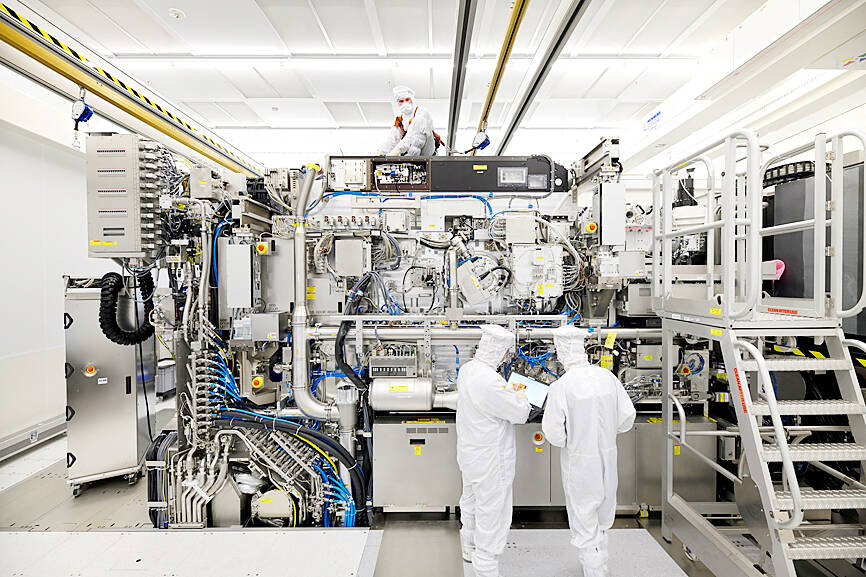The Dutch government on Wednesday announced that it is planning to impose additional restrictions on the export of machines that make advanced processor chips, joining a US push that aims at limiting China’s access to materials used to make such chips.
Dutch Minister for Foreign Trade and Development Cooperation Liesje Schreinemacher sent a letter to lawmakers outlining the proposed limitations, which come in addition to existing export controls on semiconductor technology.
“In view of technological developments and geopolitical context, the government has come to the conclusion that it is necessary for [inter]national security to extend the existing export control of specific semiconductor production equipment,” she wrote.

Photo: REUTERS / ASML / Bart van Overbeeke Fotografie
Dutch Prime Minister Mark Rutte visited US President Joe Biden in January for talks on advanced chip machines made by Dutch company ASML Holding NV and other topics.
ASML, headquartered in the southern Dutch town of Veldhoven, is the world’s only producer of machines that use extreme ultraviolet lithography to make advanced semiconductor chips.
The Dutch government has prohibited ASML from exporting some of its machines to China since 2019, but the company had still been shipping lower-quality lithography systems there.
ASML has research and manufacturing centers in Beijing and Shenzhen, China, as well as a regional headquarters in Hong Kong.
The Dutch minister’s letter to lawmakers did not mention China.
It said the new export control measures target “very specific technologies in the semiconductor production cycle on which the Netherlands has a unique and leading position, such as the most advanced deep ultraviolet [DUV] immersion lithography and deposition.”
It added that the decision for additional export controls “was made carefully and as precisely as possible, in order to avoid unnecessary disruption of the value chains and to take into account the international level playing field.”
The government said it would publish the new regulations “before the summer.”
In a statement published on its Web site, ASML said that the new restrictions would apply to its “most advanced deposition and immersion lithography tools.”
“Due to these upcoming regulations, ASML will need to apply for export licenses for shipment of the most advanced immersion DUV systems,” the company said, adding that it “will take time for these controls to be translated into legislation and take effect.”
The company added that based on the announcement, “our expectation of the Dutch government’s licensing policy, and the current market situation, we do not expect these measures to have a material effect on our financial outlook that we have published for 2023 or for our longer-term scenarios.”

Hon Hai Precision Industry Co (鴻海精密) yesterday said that its research institute has launched its first advanced artificial intelligence (AI) large language model (LLM) using traditional Chinese, with technology assistance from Nvidia Corp. Hon Hai, also known as Foxconn Technology Group (富士康科技集團), said the LLM, FoxBrain, is expected to improve its data analysis capabilities for smart manufacturing, and electric vehicle and smart city development. An LLM is a type of AI trained on vast amounts of text data and uses deep learning techniques, particularly neural networks, to process and generate language. They are essential for building and improving AI-powered servers. Nvidia provided assistance

GREAT SUCCESS: Republican Senator Todd Young expressed surprise at Trump’s comments and said he expects the administration to keep the program running US lawmakers who helped secure billions of dollars in subsidies for domestic semiconductor manufacturing rejected US President Donald Trump’s call to revoke the 2022 CHIPS and Science Act, signaling that any repeal effort in the US Congress would fall short. US Senate Minority Leader Chuck Schumer, who negotiated the law, on Wednesday said that Trump’s demand would fail, while a top Republican proponent, US Senator Todd Young, expressed surprise at the president’s comments and said he expects the administration to keep the program running. The CHIPS Act is “essential for America leading the world in tech, leading the world in AI [artificial

DOMESTIC SUPPLY: The probe comes as Donald Trump has called for the repeal of the US$52.7 billion CHIPS and Science Act, which the US Congress passed in 2022 The Office of the US Trade Representative is to hold a hearing tomorrow into older Chinese-made “legacy” semiconductors that could heap more US tariffs on chips from China that power everyday goods from cars to washing machines to telecoms equipment. The probe, which began during former US president Joe Biden’s tenure in December last year, aims to protect US and other semiconductor producers from China’s massive state-driven buildup of domestic chip supply. A 50 percent US tariff on Chinese semiconductors began on Jan. 1. Legacy chips use older manufacturing processes introduced more than a decade ago and are often far simpler than

Gasoline and diesel prices this week are to decrease NT$0.5 and NT$1 per liter respectively as international crude prices continued to fall last week, CPC Corp, Taiwan (CPC, 台灣中油) and Formosa Petrochemical Corp (台塑石化) said yesterday. Effective today, gasoline prices at CPC and Formosa stations are to decrease to NT$29.2, NT$30.7 and NT$32.7 per liter for 92, 95 and 98-octane unleaded gasoline respectively, while premium diesel is to cost NT$27.9 per liter at CPC stations and NT$27.7 at Formosa pumps, the companies said in separate statements. Global crude oil prices dropped last week after the eight OPEC+ members said they would